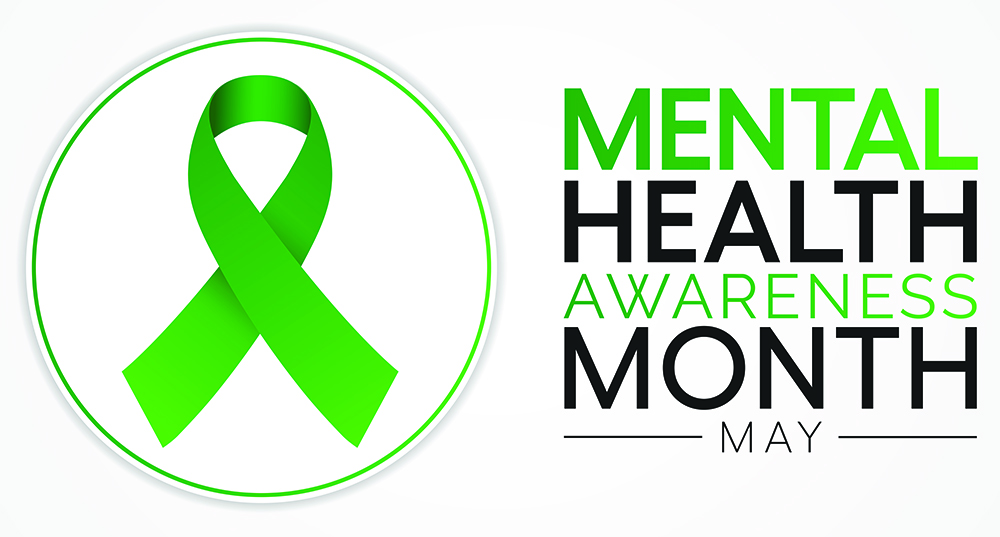Let’s Talk About Mental Health!
by Taylor Smith, CHOP5 Wellness Blogger

The month of May marks Mental Health Awareness Month. To many of you, this topic may seem taboo or uncomfortable to talk about. Maybe some of you have struggled with mental health at one point or another, while others are lucky enough to be spared. Whichever bucket you fall in, I urge you all to be cognizant of how crucial it is to take care of your own mental health as well as look out for others’ mental health. Neglecting mental health leads to serious and dangerous consequences for not only yourself, but also for others around you.
For those of you who can relate, I want to share a few of my own experiences with mental health. For those who cannot relate, I want to give you insight into what it may feel like to struggle mentally.
My Experience with Mental Health

The month of May marks Mental Health Awareness Month. To many of you, this topic may seem taboo or uncomfortable to talk about. Maybe some of you have struggled with mental health at one point or another, while others are lucky enough to be spared. Whichever bucket you fall in, I urge you all to be cognizant of how crucial it is to take care of your own mental health as well as look out for others’ mental health. Neglecting mental health leads to serious and dangerous consequences for not only yourself, but also for others around you.
For those of you who can relate, I want to share a few of my own experiences with mental health. For those who cannot relate, I want to give you insight into what it may feel like to struggle mentally.
- Some days feel easier, while other days feel harder.
- Some days I feel my anxiety consuming my mind. Swallowing up all rational thoughts. Racing through my mind a mile a minute. Coursing through my veins. Tightening my throat. Speeding up my breathing. Forcing my legs to not sit still. Making me think of fifty million things all at once. Reminding me of my past regrets and instilling future worries into me. Waves of overwhelming feelings crash into me and pass through me repeatedly.
- Other days, it may feel impossible to get out of bed. Sometimes it may feel like it takes every single muscle to will yourself to start your day. You feel like you are going through the motions. Like a cloud of fog is in your brain, making you not really feel “there”. You’re not interested in your favorite activities anymore or engaging in social interactions. All you want to do is sleep and forget about reality.
- And on the days in between, a smile spreads wide across your face. Laughter bounces off the walls in the room. You are bubbly, content and happy. You are excited for the day ahead and ready to tackle anything that life throws your way. You are full of positivity, energy and determination. You are unstoppable.
- On the good days, I look like I have my life together and am thriving.
- On the bad days, I try my hardest to hide my emotions and plaster on an “everything is fine” façade in public.
The Importance of Understanding Mental Health
These descriptions portray what it may look like to struggle with anxiety and depression and how easy it can be to conceal your true feelings because your thoughts are invisible to the naked eye. Although I only detailed feelings of anxiety and depression, it’s critical to recognize that there are many different types of mental health struggles people experience, such as eating disorders, body image, performance anxiety, bipolar disorder, OCD, and many more. More than 50% of people in the United States will be diagnosed with a mental illness or disorder at some point in their lifetime and 1 in 5 Americans will experience a mental illness each year. These statistics may seem appalling to you because you may have assumed that not many people struggle with mental health because it is not talked about as much as it should be. That needs to change.

The Negative Impacts
Unfortunately, there is a mental health crisis in the United States. This must be addressed as there are many potential negative impacts. Untreated mental health conditions can result in unnecessary disability, unemployment, substance abuse, homelessness, inappropriate incarceration, suicide and poor quality of life. To further drive the point home of how serious mental health is, I’ll leave you with thess facts:
Fast Facts
- 1 in 5 U.S. adults experience mental illness each year
- 1 in 20 U.S. adults experience serious mental illness each year
- 1 in 6 U.S. youth aged 6-17 experience a mental health disorder each year
- 50% of all lifetime mental illness begins by age 14, and 75% by age 24
- Suicide is the 2nd leading cause of death among people aged 10-14
(National Alliance on Mental Illness, 4/2023)
Start the Conversation

Those facts should scare you and lead you to take action – to start the conversation around mental health; to talk about the hard and uncomfortable stuff; to be a safe place for others to make them feel not alone; to create or pass along resources to help those struggling; to do whatever you can do to be a part of reducing the mental health crisis.
YOU Can Help Make a Difference
You may be asking, how can I help? Great question! Here are some ways:
- Know the warning signs and symptoms of mental health illnesses
- Examples may include:
- Change in feelings or demeanor
- Loss of interest
- Change in sleeping habits
- Low energy
- Difficulty interacting
- Appetite or weight changes
- Uncontrollable emotions
- Talk about mental health issues openly—be vulnerable to encourage others to speak up and know they are not alone!
- Be kind, be nonjudgmental, and have empathy for everyone you encounter!
- Share mental health resources with others in need or post on social media
- Educate yourself and others—-respond to misconceptions or negative comments by sharing facts and experiences
- Be conscious of language
- Encourage equality between physical and mental illness
- Spread awareness about the National Suicide & Crisis Lifeline: Call 988
Key Takeaways
If you take anything away from this article, I hope it is these three things:
- Mental health is just as important as physical health
- Speaking up and getting help/treatment is the strongest and best thing you can do
- Always know the warning signs/symptoms of deteriorating mental health so you can look out for not only yourself, but others around you as well
Remember to take care of yourselves (mentally and physically) each and every day, not just during awareness months!

